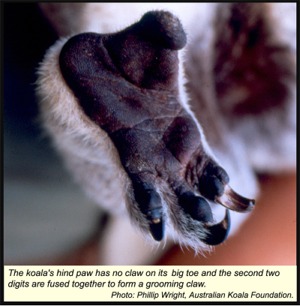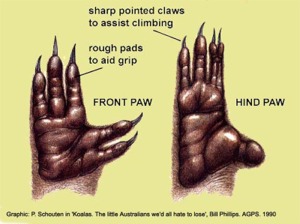| Looking at a koala, there are several distinguishing features.
First of all, the koala has a large nose. Koalas are heavily
dependent on their sense of smell. The organisms need a keen
sense of smell to determine if the eucalypts leaves that they intend
to eat are poisonous or not.
Another important feature of the
koala is their unique paws. The paws of the koala are heavily
padded, allowing for a better grip as the koalas climb.  Long, sharp claws also help the koalas when climbing. The
front paw of the koala is different from the hind paw. The
front paw has 5 digits, with 2 opposable thumbs.
Long, sharp claws also help the koalas when climbing. The
front paw of the koala is different from the hind paw. The
front paw has 5 digits, with 2 opposable thumbs.  Having 2
thumbs allows for a more secure grip on the branch. The hind
paw contains 4 digits, 1 thumb with 3 fingers. The second and
third digits of the hind paw are fused to form 1 digit with 2 claws.
The fused digit is used mostly for grooming purposes. The hind
thumb has no claw and is opposable to the other digits, resulting in
better gripping. The front and hind paws are diagrammed below,
along with photographs of both the hind paw and the front paw. Having 2
thumbs allows for a more secure grip on the branch. The hind
paw contains 4 digits, 1 thumb with 3 fingers. The second and
third digits of the hind paw are fused to form 1 digit with 2 claws.
The fused digit is used mostly for grooming purposes. The hind
thumb has no claw and is opposable to the other digits, resulting in
better gripping. The front and hind paws are diagrammed below,
along with photographs of both the hind paw and the front paw.
Another important adaptation to the koala is the dense, wooly
coat. The coat efficiently protects them from hot and cold
conditions. The coat is also water resistant to fend off most
moisture when it rains. The color of the fur varies depending
on what part of Australia the koala habitats. In the south,
fur tends to be darker and thicker, sometimes browner, than in the
north. All koalas have patches of white fur inside the ears,
on their chins, chests and necks, and inside the front limbs.
Sometimes they have white fur on the back of the hind limbs, and
usually it is in patches on their bottom. The fur on their
rumps is used for padding because of the hard branches it constantly
sits on. The combination of white and gray, sometimes brown,
fur has properties of camouflage. Mature males have a brown
scent gland in the center of their chest. The males rub their
scent on the tree trunks to deter other koalas, especially other
males, from entering their home trees. The koalas are very
territorial.
The koala lifestyle shows adaptations as well.
Koalas are mostly
nocturnal animals. They do not have a true nocturnal lifestyle
because they are known to sometimes sleep at night and move around
during the day.
 This occurs because koalas sleep 18-22 hours
each day, and, because of this, their sleep cycle will not always
match up with our 24 hour day system. The immense amount of
sleep required by the koala is due to their low energy, hard to
digest diet (Learn more about this in
Nutrition section). Sleeping conserves energy that is
dedicated to digestion. This occurs because koalas sleep 18-22 hours
each day, and, because of this, their sleep cycle will not always
match up with our 24 hour day system. The immense amount of
sleep required by the koala is due to their low energy, hard to
digest diet (Learn more about this in
Nutrition section). Sleeping conserves energy that is
dedicated to digestion.
Koalas spend most of their lives in trees. They can get
from tree to tree by jumping. The only time that the koala
will come down from the tree is if the next tree is too far to jump
to or during the mating season. Their movement on land is
awkward, and once they are on the ground they are at risk, whether
it be from being hit by a car or an attack from a dog. Koalas
have the ability to run, though. Also, koalas are good
swimmers.
|